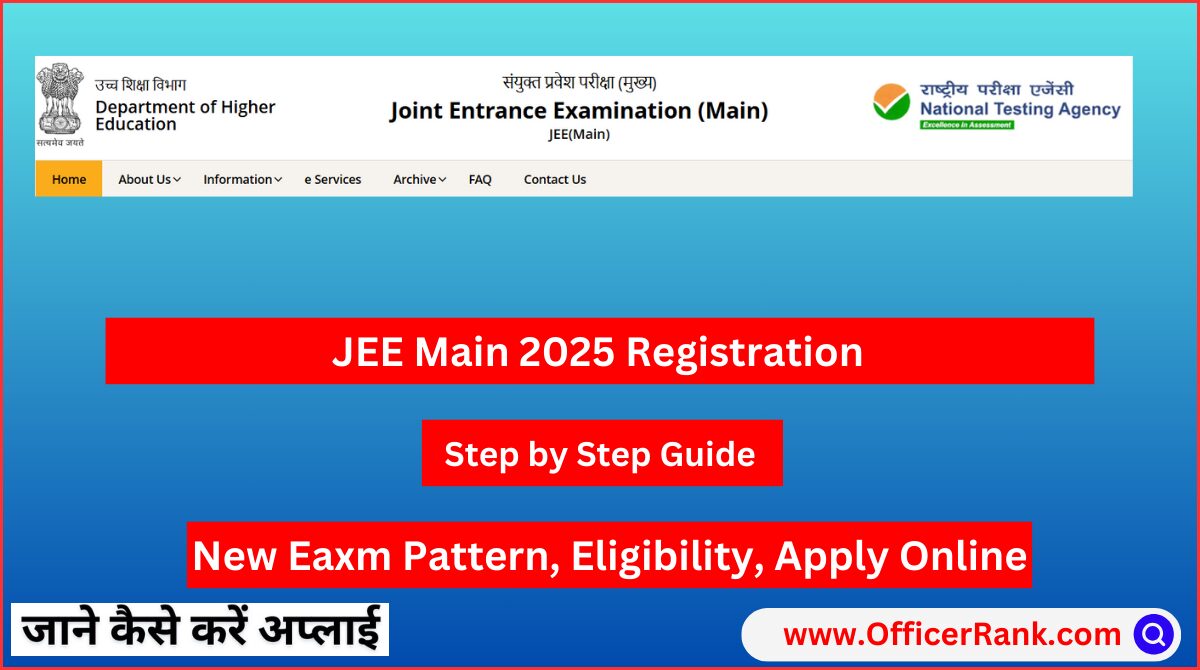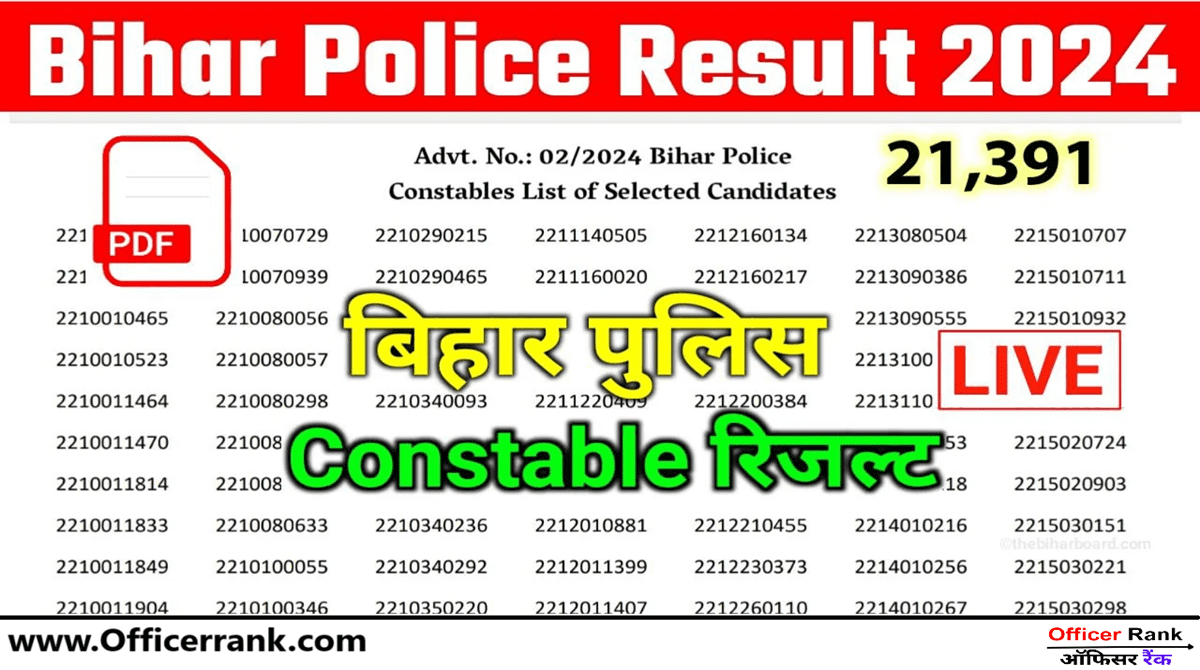Registration for JEE Main 2025 Session 1 will begin on October 28, 2024, and will continue for four weeks. Candidates interested in BE/BTech admissions for the academic year 2025-26 can register and apply by visiting the official website.
JEE Main 2025 Registration
Registration for the Joint Entrance Examination (Main) for the January 2025 Semester is available on the official website (https://jeemain.nta.ac.in/). Candidates are advised to check the examination period from October 28, 2024, to November 22, 2024, on the official website of the National Examinations Authority.
| Details | Information |
|---|---|
| Exam Name | JEE Main 2025 |
| Conducting Authority | National Testing Agency (NTA) |
| Registration Start Date | October 28, 2024 |
| Last Date to Fill Application Form | November 22, 2024 |
| Last Date for Fee Submission | November 22, 2024 (11:50 PM) |
| Application Fee | Male: UR/OBC/EWS ₹1,000; SC/ST/PwBD ₹500; Female: UR/OBC/EWS ₹800; SC/ST/PwBD ₹500 |
| Application Mode | Online |
| Official Website | jeemain.nta.nic.in |
| JEE Main Sessions | Session 1: January 2025 Session 2: April 2025 |
| Release of City Intimation Slip | 1st week of January 2025 |
| Admit Card Release Date | 3 days before exam date |
| JEE Main Exam Date | January 22 to January 31, 2025 |
| Answer Key Release Date | To be announced |
| Result Declaration Date | 3 days before the exam date |
| Exam Mode | Computer-Based Test (CBT) |
| Eligibility | 12th pass or appearing in 2025 |
| Application Fee | Varies by category and session |
| Subjects Covered | Physics, Chemistry, Mathematics |
| Exam Duration | 3 hours |
| Language Options | English, Hindi, and other regional languages |
JEE Main 2025 Application Form
The JEE Main 2025 application form will be available after successful registration and can be accessed by providing the required login credentials such as application number and date of birth. The last date for submission of JEE Main 2025 Session 1 application form is the same as the last date for registration.

How to apply for the JEE Main 2025?
The step-by-step instructions to apply for JEE Main 2024 is available below. The apply process is divided in two stages, which are Registration and Application Forms, get the details from below.

Step 1: Visit the Official Website
- Go to the official JEE Main website: jeemain.nta.nic.in.
Step 2: Register for JEE Main
- Click on the “JEE Main 2024 Registration” link on the homepage.
- Select “New Registration” and read all instructions carefully.
- Agree to the terms and conditions, then click “Proceed to Apply Online”.
- Fill in your details (name, date of birth, gender, etc.), contact details (phone number, email), and academic details.
- Create a password and security question for login.
- Note the system-generated application number for future reference.
Step 3: Fill Out the Application Form
- Login using the application number and password.
- Complete the remaining sections, including educational qualification details, preferred exam cities, and parent/guardian information.
Step 4: Upload Required Documents
- Upload scanned copies of the following as per specifications:
- Passport-size photograph (recent, colored, clear background).
- Signature (clear and in JPG/JPEG format).
- Other documents, if required (such as caste certificate for reserved categories).
- Ensure each file is within the specified size and format mentioned on the application portal.
Step 5: Pay the Application Fee
- Choose the payment method (credit card, debit card, net banking, UPI, or e-wallet).
- Pay the fee according to your category and the number of sessions you’re applying for.
- After successful payment, a confirmation receipt will appear.
Step 6: Download the Confirmation Page
- Once payment is complete, download and print the confirmation page as proof of successful application submission.
Step 7: Check Application Status
- Log in periodically to the JEE Main portal to check the status of your application.
JEE Main 2025 Correction Window
The JEE Main 2025 Session 1 revision date can be checked on the official website https://jeemain.nta.ac.in/ within 3-5 days after submission of the application form. Candidates who have made any errors while submitting the application form can log in to the web portal to revise.
JEE Main 2025 Eligibility Criteria
To apply for Joint Entrance Exam (Main) 2025, a candidate must meet a certain eligibility, whose details are available below.
- A candidate must have passed Intermediate exam with PCM in 2022, 2023 or 2024, with at least 75% score as aggregate from a school recognized by any State or Central Board.
- Students who are going to participate in the Intermediate exam for the academic year 2024-25, or waiting for the announcement of the result are also eligible to participate.
- There is no cap of minimum or maximum age limit to sit in this examination.
EE Main 2025 Application Fee
To apply for JEE Main 2025 Session 1, a candidate will have to pay the required application fee whose details are available below.
- Male:
- UR/OBC/EWS: ₹1,000/-
- SC/ST/PwBD: ₹500/-
- Female:
- UR/OBC/EWS: ₹800/-
- SC/ST/PwBD: ₹500/-
It is mandatory to pay the application fee for JEE Main 2025 using the debit card, credit card, or any other provided payment, because without it no application form will be accepted.
JEE Mains 2025 syllabus
The JEE Main 2025 syllabus is divided into three main subjects: Physics, Chemistry, and Mathematics. Here’s a brief overview of the syllabus for each subject:
Physics
- Physics and Measurement: Units, fundamental and derived units, least count, accuracy and precision of measuring instruments, errors in measurement, dimensional analysis, and its applications.
- Kinematics: Motion in a straight line, position-time graph, speed and velocity, uniform and non-uniform motion, average speed, and instantaneous velocity, uniformly accelerated motion, velocity-time graph, relations for uniformly accelerated motion, scalars, and vectors, vector addition and subtraction, zero vector, scalar and vector products, unit vector, resolution of a vector, relative velocity, motion in a plane, projectile motion, uniform circular motion.
- Laws of Motion: Force and inertia, Newton’s laws of motion, momentum, impulse, Newton’s third law of motion, law of conservation of linear momentum and its applications, equilibrium of concurrent forces, static and kinetic friction, laws of friction, rolling friction, dynamics of uniform circular motion, centripetal force and its applications.
- Work, Energy, and Power: Work done by a constant force and a variable force, kinetic and potential energies, work-energy theorem, power, potential energy of spring, conservation of mechanical energy, conservative and non-conservative forces, elastic and inelastic collisions in one and two dimensions.
- Thermodynamics: Laws of thermodynamics, ideal gas equation, specific heats, calorimetry, first law of thermodynamics, second law of thermodynamics, Carnot’s cycle, heat engines, refrigerators, and heat pumps.
- Electrostatics: Electric charge, Coulomb’s law, electric field, electric potential, equipotential surfaces, Gauss’s theorem, electric flux, dielectrics, electric polarization, capacitors, and capacitance.
- Current Electricity: Electric current, drift velocity, Ohm’s law, electrical resistance, resistivity, electrical conductivity, Kirchhoff’s laws, Wheatstone bridge, electric circuits, series and parallel circuits, electrical power and energy, electrical resistors, and color coding of resistors.
- Magnetic Effects of Current and Magnetism: Magnetic field, magnetic lines of force, magnetic flux, Faraday’s laws of electromagnetic induction, Lenz’s law, induced EMF and current, motional EMF, electric generators, transformers, and alternating currents.
- Electromagnetic Induction and Alternating Currents: Electromagnetic induction, Faraday’s laws, Lenz’s law, induced EMF and current, motional EMF, electric generators, transformers, alternating currents, RMS value of alternating current, and phasor diagrams.
- Electromagnetic Waves: Nature of electromagnetic waves, sources of electromagnetic waves, velocity of electromagnetic waves, electromagnetic spectrum, refraction and reflection of light, optical instruments, wave theory of light, Young’s double-slit experiment, interference of light, diffraction of light, polarization of light, photoelectric effect, and quantum nature of light.
- Optics: Ray optics and optical instruments, reflection and refraction of light, mirrors, refraction through lenses, thin lens formula, magnification, power of lenses, a combination of thin lenses in contact, optical instruments, spherical mirrors, and refraction through lenses.
- Dual Nature of Matter and Radiation: Photoelectric effect, wave-particle duality, de Broglie wavelength, Heisenberg’s uncertainty principle, Bohr’s model of atom, atomic spectra, and X-rays.
- Atoms and Nuclei: Atomic structure, Rutherford’s model of atom, Bohr’s model of atom, hydrogen atom, atomic spectra, and X-rays.
- Electronic Devices: Semiconductor devices, diodes, transistors, and their applications.
- Gravitation: Newton’s law of gravitation, gravitational field, gravitational potential, escape velocity, Earth’s magnetic field, and motion of satellites.
- Rotational Motion: Angular displacement, angular velocity, angular acceleration, moment of inertia, torque, rotational kinetic energy, and angular momentum.
- Laws of Friction: Static and kinetic friction, laws of friction, rolling friction, and applications of friction.
- Dynamics of Uniform Circular Motion: Centripetal force and its applications.
- Kinetic Theory of Gases: Ideal gas equation, kinetic theory of gases, degrees of freedom, and specific heats.
- Properties of Solids and Liquids: Elastic properties of solids, stress-strain relationship, Young’s modulus, bulk modulus, rigidity modulus, thermal properties of matter, conduction, convection, and radiation.
Chemistry
- Some Basic Concepts of Chemistry: Importance of chemistry, laws of chemical combination, Dalton’s atomic theory, Avogadro’s number, mole concept, molar mass, and calculations involving molar mass.
- Structure of Atom: Thomson’s model of atom, Rutherford’s model of atom, Bohr’s model of atom, and quantum mechanical model of atom.
- Classification of Elements and Periodicity in Properties: Periodic table, groups and periods, trends in the periodic table, atomic radius, ionization enthalpy, electron gain enthalpy, electronegativity, and valency.
- Chemical Bonding and Molecular Structure: Ionic bonding, covalent bonding, hydrogen bonding, Van der Waals forces, valence bond theory, molecular orbital theory, and hybridization.
- States of Matter: Gases and Liquids: Kinetic molecular theory, ideal gas equation, real gases, deviation from ideal behavior, liquefaction of gases, and critical temperature.
- Thermodynamics: System and surroundings, types of system, state functions, first law of thermodynamics, internal energy, enthalpy, entropy, and free energy.
- Thermodynamics: Laws of Thermodynamics: Zeroth law of thermodynamics, first law of thermodynamics, second law of thermodynamics, and third law of thermodynamics.
- Thermodynamics: Spontaneous Processes and Gibbs Energy: Spontaneous and non-spontaneous processes, Gibbs free energy, and criteria for spontaneity.
- Equilibrium: Chemical and Physical: Equilibrium in physical and chemical processes, dynamic equilibrium, law of mass action, equilibrium constants, and Le Chatelier’s principle.
- Redox Reactions and Electrochemistry: Redox reactions, oxidation numbers, electrochemical cells, standard electrode potentials, Nernst equation, and electrochemical series.
- Hydrogen: Preparation, Properties, and Uses: Preparation of hydrogen, properties of hydrogen, and its uses.
- s-Block Elements (Alkali and Alkaline Earth Metals): General properties of s-block elements, trends in the properties of s-block elements, and their compounds.
- p-Block Elements: General properties of p-block elements, trends in the properties of p-block elements, and their compounds.
- d- and f-Block Elements: General properties of d-block and f-block elements, trends in the properties of d-block and f-block elements, and their compounds.
- Coordination Compounds: Coordination number, coordination compounds, isomerism in coordination compounds, and Werner’s theory.
- Haloalkanes and Haloarenes: Preparation, properties, and uses of haloalkanes and haloarenes.
- Alcohols, Phenols, and Ethers: Preparation, properties, and uses of alcohols, phenols, and ethers.
- Aldehydes, Ketones, and Carboxylic Acids: Preparation, properties, and uses of aldehydes, ketones, and carboxylic acids.
- Amines: Preparation, properties, and uses of amines.
- Biomolecules: Carbohydrates, proteins, nucleic acids, and vitamins.
- Polymers: Types of polymers, polymerization reactions, and properties of polymers.
- Environmental Chemistry: Air pollution, water pollution, soil pollution, and waste management.
- Organic Chemistry: Some Basic Principles and Techniques: General organic
Mathematics
Sets, Relations, and Functions: Sets, relations, functions, types of functions, inverse of a function.
Complex Numbers and Quadratic Equations: Complex numbers, algebra of complex numbers, quadratic equations, nature of roots of quadratic equations.
Matrices and Determinants: Matrices, operations on matrices, determinants, adjoint and inverse of a matrix.
Vector Algebra: Position vectors, scalar and vector products, applications of vectors.
Three-Dimensional Geometry: Lines, planes, spheres, cylinders, cones, paraboloids.
Conic Sections: Parabola, ellipse, hyperbola, their equations, properties, applications.
Probability: Introduction to probability, conditional probability, Bayes’ theorem, Bernoulli trials, and Binomial distribution.
Statistics and Probability Distributions: Measures of central tendency, measures of dispersion, probability distributions, and normal distribution.
Calculus: Limits, continuity, differentiability, Rolle’s theorem, mean value theorem, applications of derivatives, integrals, applications of integrals, differential equations.
How after applying for the JEE Main 2025?
After successfully registering and submitting your application for JEE Main 2025, the city nomination and first session admit card will be issued 3 days to 5 days before the exam date respectively after thorough scrutiny by the National Testing Agency.

JEE Main Important Dates
| Registration Start Date | October 28, 2024 |
| Last Date to Fill Application Form | November 22, 2024 |
| Last Date for Fee Submission | November 22, 2024 (11:50 PM) |
JEE Main FAQs
What is the JEE Main 2025 exam date?
The JEE Main 2025 exam will be held in two sessions: January 22 to January 31, 2025, and April 2025.
How to apply for JEE Main 2025?
Visit the official website: jeemain.nta.nic.in. Click on “Online Application Form for JEE (Main) – 2025 Session-1”, fill in the required details, upload documents, pay the application fee, and submit the form.
What are the eligibility criteria for JEE Main 2025?
Candidates must have completed or be appearing for their Class 12th or equivalent exam in 2024 or 2025. General category candidates need to secure at least 75% in their Class 12 exams, while SC/ST candidates need around 65%.
Can I correct my online application form for JEE Main 2025?
Yes, an opportunity for making corrections in the application form will be provided after the closing date of the online submission.
What is the exam pattern for JEE Main 2025?
The exam consists of two papers: Paper 1 for B.E./B. Tech and Paper 2 for B.Arch and B.Planning. The pattern includes multiple-choice questions (MCQs) and numerical value questions.
What is the syllabus for JEE Main 2025?
The syllabus covers topics from Physics, Chemistry, and Mathematics based on the Class 11th and 12th curriculum.
How can I download the admit card for JEE Main 2025?
The admit card will be available for download 3 days before the exam date on the official website.
When will the JEE Main 2025 results be declared?
The results will be declared on February 12, 2025, for the January session
What is the tie-breaking policy for JEE Main 2025?
In case of a tie, the NTA score in Mathematics, followed by Physics and Chemistry, will be considered. If the tie persists, candidates will be assigned the same rank.
Are there any changes in the JEE Main 2025 exam pattern?
Yes, the option to choose 5 out of 10 numerical questions in Section B has been removed.
Kindly check all the information on the JEE Main official website: jeemain.nta.nic.in.




